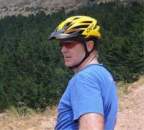- Posts: 1838
- Thank you received: 411
Heart rate while racing?
- [email protected]
-

- Offline
- Admin
It is interesting to review the track afterwards: if my HR starts dropping towards the end of the race I figure I'm not fit; if I can push it up for the last five mins then I'm good.
What I found really interesting though was that in choppy water on a tippy boat I can't get my HR up to the same level that I can in the same conditions on a more stable boat - which to me is another indication that tippy makes for less ability (for me) to go at 100%.
Rob
Currently Epic V10 Elite, Epic V10 Double.
Previously: Swordfish S, Evo II, Carbonology Zest, Fenn Swordfish, Epic V10, Fenn Elite, Red7 Surf70 Pro, Epic V10 Sport, Genius Blu, Kayak Centre Zeplin, Fenn Mako6, Custom Kayaks ICON, Brian's Kayaks Molokai, Brian's Kayaks Wedge and several others...
Please Log in or Create an account to join the conversation.
- [email protected]
-

- Offline
- Admin
- Posts: 1838
- Thank you received: 411
When the wind isn't blowing, we often chase an 88ton catamaran tourist boat as it goes out 4km taking tourists to view seals at an island near Hout Bay here in Cape Town.
I used to think it was an easy option - after all you're just riding the wake.
But here's my latest HR trace from yesterday. We chased Nauticat out to the island, then chased her back in again. Then we figured that we should "get some exercise" and we tapped back out again to the island. On paddling around the island we saw that Nauticat had unexpectedly done another trip... We waited and then rode her wake back to the harbour.
Here's the thing - my HR during the "soft" wake riding was actually far higher than the unassisted paddling section when we went out to the island the second time. So, we're scoring in a couple of ways when we chase Nauticat:
- It's a hell of a lot more fun than grinding away on the flat
- It's great practise for catching and staying on small runs
- And... it's clearly great training, given how high my HR was getting!
Here's the trace:
Garmin connect - chasing Nauticat
Rob
Currently Epic V10 Elite, Epic V10 Double.
Previously: Swordfish S, Evo II, Carbonology Zest, Fenn Swordfish, Epic V10, Fenn Elite, Red7 Surf70 Pro, Epic V10 Sport, Genius Blu, Kayak Centre Zeplin, Fenn Mako6, Custom Kayaks ICON, Brian's Kayaks Molokai, Brian's Kayaks Wedge and several others...
Please Log in or Create an account to join the conversation.
- zachhandler
-

- Offline
- Platinum Member
- Posts: 785
- Thank you received: 195
Have you ever noticed that at a high heart rate paddling (say 5 beats below max) is not nearly as painful as that same heart rate would be while running, biking, or cross country skiing? Paddling at that effort you could likely speak a short phrase to a fellow paddler if needed. Running at that effort is a lung-searing pain and it is impossible to even put together two syllables.
This puzzled me for years. I finally came across some studies that explained this anomaly. When doing a predominantly upper body excise like paddling, all the contraction of core and chest muscles increase the hydrostatic pressure within the thoracic cavity. This impedes the return of low pressure venous blood to the right side of the heart. The heart can't fill completely, so each heart beat ejects less blood. The heart compensates by increasing the heart rate. Like driving down the highway in 4th gear instead of 5th.
The other point you should keep in mind is that the formulas to predict max heart rate are worthless, and comparing your heart rate to another persons is meaningless. On my university running team, I was the too runner along with another guy. We ran all the same times in workouts and in races. His resting heart rate was in the 50s and mine was in the 30s. His max was in the 200s and mine was 180. Neither of us was fitter than the other. I simply had a large volume slow heart and he had a small fast one.
I'm too lazy to look up the studies again. But I recall they used hand bikes ergometers vs to standard leg bike ergometers and estimated that at any given rate of total body energy expenditure, the upper body exercise would be accompanied by a 15 beat increase in heart rate.
Hope all this is of interest.
Current Skis: Nelo Vanquish AIR, Epic V10g4, NK 670 double, NK exrcize, Carbonology Feather, Think Jet, Knysna Sonic X
Former Skis: Epic v10g3, Kai Waa Vega, Epic V12 g2, Epic V12 g1, Epic v10 double, Nelo 550 g2, Fenn Elite S, Custom Kayaks Synergy
Please Log in or Create an account to join the conversation.
But, downwind on the ski in some decent conditions, the rate jumps 20bpm. I think it's something like the difference between your heart rate reading a newspapper, compared to your heart rate reading a newspaper with someone pointing a gun at you.
Please Log in or Create an account to join the conversation.
- Kayaker Greg
-

- Offline
- Platinum Member
- Epic V10L, Stellar SES, SEL, Fenn Swordfish
- Posts: 822
- Thank you received: 115
For those that train by feel and take no effort to train the body to utilise all the available energy systems effectively, you are missing out.
Please Log in or Create an account to join the conversation.
I understand the desire to compare HR, just like comparing how much you can bench press, but, as said in previous posts, the comparison is irrelevant. There are many variables why your HR may be less or more than someone else. Do not fall into this trap of comparison.
HR can be used as a good indicator of intensity, with important data that can be used for comparison between the exercise sessions of the athlete (not another athlete). Having used a HR monitor for many years as an athlete and coach, I quickly realised that using the monitor made training very complex and clinical in training situations that had many variables. We could never replicate conditions experienced in the lab where these conditions could be controlled.
Programs were being spruiked that had multiple levels of HR zones that an athlete must adhere to so as to train a specific fitness parameter, often within 10-15bpm, a very narrow band. It looked good and sold lots of books, but very hard to implement effectively. Finally, we realised that if you knew just one HR number, and could honestly evaluate your own exertion level, the HR monitor became an effective tool. If you know your anaerobic threshold for the specific activity you do, then your HR monitor can be a great training and racing aid.
Nothing compares to actually training hard. Periodisation is necessary, recovery is essential, HR data is good. But when it comes down to it, if you are not pushing the limits of your fitness, skill, or strength in training, improvements will come slowly or not at all. Don't be afraid of hitting the wall sometimes, that's where the good stuff happens, right when you think you can't hold on for another second, and you do. Don't let an electronic watch tell you when you have had enough.
Please Log in or Create an account to join the conversation.
Please Log in or Create an account to join the conversation.
MarkS wrote: Any U.S. dealers for the Kayak Cadence Monitor? How fast can I get one shipped to the U.S. if not?
If you don't have a local dealer, I can ship if that helps.
Please Log in or Create an account to join the conversation.
Please Log in or Create an account to join the conversation.
responsible for the great kiwi runners of the 60's,70's and 80's. Ian Ferguson also trained by his methods, he is one of the worlds greatest kayakers with 4 olympic golds and 1 silver 5 world championship medals.
It dosn't make any difference if you are a runner or a kayaker the principles of training are the same, have a look at this link if you are interested in how to get fit.
lydiardfoundation.org/training.aspx
Not a heart rate monitor to be seen
Please Log in or Create an account to join the conversation.
- Kayaker Greg
-

- Offline
- Platinum Member
- Epic V10L, Stellar SES, SEL, Fenn Swordfish
- Posts: 822
- Thank you received: 115
And the man who took his place as National kayak coach Gordon Walker says the following....
"It is the best thing I have ever bought for training with in terms of value for money. It's a speedo for your bike, run or kayak. It's a heart rate monitor. It can map. It stores many, many training sessions and can be uploaded to all sorts of training software. They are absolutely awesome tools."
www.sportzhub.com/site/index.php?option=...nt&task=view&id=8443
Times move on, methods and tools improve, Wing paddles, GPS, heartrate monitors, power metres, cadence metres, lactate tests, V02 testing, we can choose to use them or not, your choice to use them or not. In Lydiard's time it was time over distance with a stop watch. Bit harder to get an accurate consistent gage on the water with currents, wind and sea state for any given day's workout with so many variables with a stop watch. If all you do is train on a flat windless K1 course a stop watch might be all you need. Where I paddle I have currents, wind and waves, different every day. This is where heartrate and GPS helps to build a decent database for seeing if what you are doing is smart training or not.
Please Log in or Create an account to join the conversation.
Please Log in or Create an account to join the conversation.
Please Log in or Create an account to join the conversation.
- kevin brunette
-

- Offline
- Junior Member
- Posts: 33
- Thank you received: 11
I think watching my heart rate limits my approach to racing. A heart rate has little bearing on how I am feeling, the way I am paddling and does not take race tactics into account. I don’t want it to reduce my effort because my heart rate monitor is bleeping a warning message.
When pacing a course, I work out a comfortable, but hard pace for the distance. Any time above this rapidly depletes my energy. I know I can manage 80 percent all day, but can last only for a few minutes at 90 percent plus before I have to back off. The start and finish are quite different, during which I am definitely in the red zone.
Every tactical change forces an adjustment in effort, and therefore my heart rate. I try to make the most of my energy, knowing each time I accelerate or paddle too fast, I dig into my resources much more quickly. I am more conscious of my overall average heart rate than an instantaneous measurement.
FENN Bluefin, XT, Swordfish S
Author and publisher at South Easter Communications of books in the SURFSKI series, aimed at recreational to advanced paddlers. Look at the Facebook page Surfski know-how and visit www.lulu.com/spotlight/southeastercommunications
Please Log in or Create an account to join the conversation.
Life truly lived is full of risk; to fence out risk is to fence out life itself
Please Log in or Create an account to join the conversation.
Latest Forum Topics
-
- In Depth Review - Kai Wa'a Vega Flex -vs- Fenn Swordfish S
- 4 days 19 hours ago

